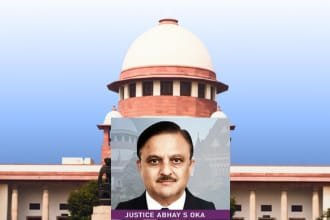In a significant judgment balancing institutional autonomy with student rights, the Supreme Court of India on May 2, 2025, upheld the Tata Institute of Social Sciences’ (TISS) decision to suspend Dalit PhD scholar Ramadas KS. However, the Court also ordered that the two-year suspension imposed on the student leader be curtailed to the period he has already undergone, thereby granting him relief and paving the way for his reinstatement.
Background: Suspension and Allegations
Ramadas KS, a PhD scholar at TISS and a vocal left-leaning student activist, was suspended in April 2024 for two years. The suspension stemmed from his involvement in a series of student-led protests and politically sensitive activities, including the screening of a banned BBC documentary, participation in a midnight protest over speaker restrictions, and organizing a screening of the controversial documentary Raam Ke Naam on the day of the Ram Mandir’s inauguration.
TISS, in its public defense, claimed that Ramadas had violated institutional rules while enjoying Central government scholarships reserved for Scheduled Caste (SC) students. The institute alleged a deviation from academic pursuits toward political activism, leading its Empowered Committee to impose a two-year suspension.
High Court Dismisses Challenge; Supreme Court Steps In
Following the suspension, Ramadas challenged the order before the Bombay High Court, arguing that his constitutional rights to free speech and protest had been infringed. In March 2025, the High Court dismissed his plea, upholding the authority of the educational institution to regulate student conduct.
Aggrieved by the High Court’s decision, Ramadas approached the Supreme Court of India, invoking his right to education and protection against arbitrary disciplinary action.
Supreme Court’s Observations
The Bench comprising Justice Dipankar Datta and Justice Manmohan heard the case and took a nuanced approach. While the Court upheld the authority of TISS to initiate disciplinary action, it expressed concern over the proportionality of the punishment.
The Court acknowledged that students must maintain decorum and adhere to institutional guidelines, especially when receiving government-sponsored benefits. However, it also recognized the role of educational spaces as breeding grounds for critical thinking, dissent, and free expression.
In its ruling, the Supreme Court observed that although Ramadas’ actions may have breached the institution’s code of conduct, a two-year suspension was excessive. The Court directed TISS to treat the suspension as limited to the period already undergone and ordered the immediate reinstatement of the scholar.
Key Legal Takeaways
- Institutional Autonomy vs. Student Rights: The judgment reiterates the delicate balance between an institute’s right to maintain discipline and a student’s right to freedom of expression. While upholding institutional autonomy, the Court emphasized the need for proportional disciplinary measures.
- Proportionality Principle: The ruling reinforces the legal doctrine of proportionality in disciplinary matters. Even if misconduct is established, punishment must not be disproportionately harsh, especially in academic contexts where futures are at stake.
- Due Process in Student Discipline: The Court’s direction to TISS to place on record the materials relied upon by its Empowered Committee reflects the judiciary’s insistence on transparency and procedural fairness in disciplinary proceedings.
- Protection for Marginalized Students: The fact that Ramadas is a Dalit scholar receiving Central government scholarships adds a layer of social sensitivity. The Court’s intervention ensures that institutional actions do not disproportionately impact students from marginalized communities.
Implications for Academic Institutions
This judgment will likely serve as a precedent for handling student protests and disciplinary issues in universities and colleges across India. It underlines the need for clear guidelines, procedural safeguards, and proportionate sanctions while dealing with student dissent.
Institutions must now tread cautiously when taking action against students involved in activism, ensuring that academic penalties do not become tools of ideological suppression.
Political and Social Reactions
Ramadas KS, known for his activism and alignment with leftist student organizations, has received widespread support from various student groups and civil rights bodies. His suspension had sparked protests and debates around academic freedom and political expression in campuses.
With the Supreme Court’s order of reinstatement, Ramadas is expected to resume his research at TISS. Activists have welcomed the verdict as a victory for democratic values within educational institutions.
Meanwhile, TISS has yet to officially respond to the judgment, but the directive to reinstate Ramadas will likely influence how the institution approaches dissent in the future.
Timeline of Events
- January 2023: Ramadas called for screening of a banned BBC documentary.
- April 2024: TISS suspends Ramadas for two years for “anti-national” activities.
- March 2025: Bombay High Court dismisses his challenge to the suspension.
- May 2, 2025: Supreme Court upholds suspension but reduces it to time served.
Broader Legal Context
The Supreme Court’s decision comes in the backdrop of rising tensions between student activists and university administrations across India. From JNU to Jamia Millia and TISS, campuses have become flashpoints for debates on nationalism, freedom of expression, and state surveillance.
The verdict in Ramadas KS vs. TISS adds to the growing jurisprudence on the rights of students within higher education institutions and the limits of disciplinary control.
Conclusion
The Supreme Court’s order in favor of Ramadas KS is both a validation of institutional discipline and a safeguard against punitive excesses. It protects the rights of students—especially those from disadvantaged backgrounds—while affirming that educational spaces must allow room for dissent and debate.
By restoring Ramadas to his academic program, the apex court has signaled that while institutions can and should enforce discipline, such measures must align with constitutional principles of fairness, equity, and proportionality.


